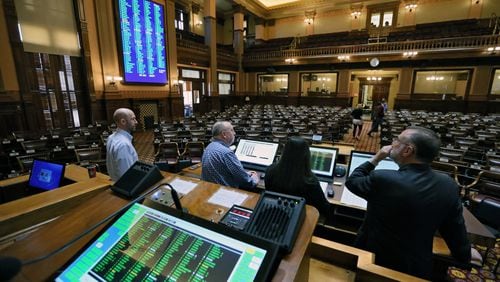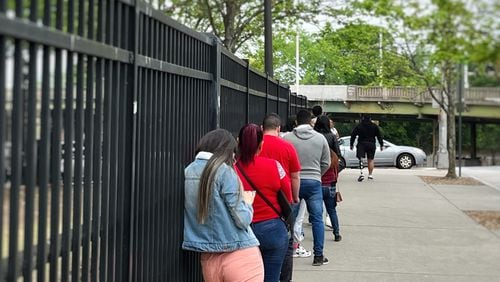With Georgia lawmakers set to return to Atlanta on Monday, the state’s voters are wary of a repeat of 2016 legislative battles over religious liberty and gun bills, a new poll for The Atlanta Journal-Constitution found.
The poll, conducted last week, found voters content to let Gov. Nathan Deal’s vetoes of both bills stand amid hopes that members of the General Assembly instead focus on more important issues such as jobs and education. Among the poll’s findings:
- Forty-four percent of respondents oppose lawmakers again trying to pass a religious liberty bill. Only 40 percent support it.
- Fifty-four percent say lawmakers should not try to pass a campus gun bill again.
- Supporters of casino gambling take heart: 56 percent of Georgians support the idea, compared with just 38 percent opposed.
- Sixty-one percent support expanding school choice for parents, and of those, 69 percent remain supportive even if it means sending public tax dollars to private schools.
- An overwhelming majority, 71 percent, support expanding medical marijuana in Georgia to include an in-state harvesting program.
Despite giving the state’s economy high marks, 29 percent of respondents said the economy and jobs are the most important issue facing Georgia today. The only other issue to break double digits (10 percent) was the quality of public schools or education.
‘Religious liberty’
Lawmakers in 2016 passed House Bill 757, which would have allowed faith-based organizations to deny services to those who violate their "sincerely held religious belief" and preserve their right to fire employees who aren't in accord with those beliefs.
It also mirrored language found in the federal Religious Freedom Restoration Act, which was signed by President Bill Clinton and adopted by dozens of states, requiring government to prove a “compelling governmental interest” before it interferes with a person’s exercise of religion.
Business groups and LGBT advocates protested. They warned Georgia would suffer the same fate as Indiana and North Carolina — the loss of jobs, economic development and prestige — after those states passed similar measures. Deal vetoed the bill in April, a move that angered social conservatives who vow to bring it back this year.
Already, however, top lawmakers are distancing themselves from it.
"We've dealt with that for three years," said Speaker David Ralston, R-Blue Ridge. "I've taken the hits on a couple of those years and I'm willing to take the hits again this year. … I'm not going to devote a lot of energy to that this session because it's taken too much, frankly."
Even top Senate Republicans, who last year championed the move, said it is not on their 2017 priority list.
"Once a bill has been vetoed by the governor, it takes more, overwhelming support to bring it back," Senate Majority Leader Bill Cowsert, R-Athens, said recently.
The AJC's poll would appear to give them some cover for that decision. Only 40 percent of respondents said they support an effort to revive the bill, although a majority of Republicans, 54 percent, said they would favor it. Nearly as many Democrats and independents would rather lawmakers leave the issue alone. A year ago, a similar AJC poll found 52 percent of Georgians supported the bill.
Ned Blodgett, 46, of Smyrna, is among those who believe the lawmakers should move on.
“I’m against what the laws in North Carolina have done,” said Blodgett, who works in sales. “The whole debate is just so polarizing.”
Yet, Annie Jones, a 73-year-old retiree from Atlanta, said lawmakers have increasingly abandoned biblical principles.
“I don’t feel like lawmakers are listening to Georgians,” she said. “A Christian needs to have rights. We don’t hate gay folks, we just believe in the Bible.”
Everything comes back around, Ken Poynter, an 88-year-old retiree from Conyers said. Legislators will one day find out, he said.
“All these debates can be silly,” Poynter said. “People are not as concerned with religious liberty as they used to be. Religion is not on the front burner as it used to be. One of these days religion will be back and lawmakers will pay attention.”
Guns on campus
Georgia voters continue to oppose efforts to legalize guns on the state’s college campuses, the poll shows.
More than half of voters — 54 percent — said they do not want state lawmakers to pursue the issue again this year, after Deal vetoed a bill last year that would have allowed anyone 21 or older with a license to carry a concealed gun anywhere on a public college or university campus, except for inside dormitories, fraternities and sorority houses, and at athletic events.
The number of naysayers, however, dropped from three years ago, when an AJC poll asking voters a differently worded question (whether they opposed allowing guns on the state's college campuses) showed more than two-thirds of them did.
“If you’re responsible and you have the proper permitting, you should be allowed to” carry a firearm on campus, said Matt Janor, 26, an electrician in Gwinnett County.
Students on campus now are “defenseless” and left to “hope that police and security respond in time,” he said.
Allowing guns on campus has long been opposed by the powerful University System of Georgia and leaders of the state’s universities and colleges because of concerns about the maturity of students and safety on campus.
Still, state lawmakers have pursued it despite public opposition as they have sought to burnish the state’s reputation as one of the nation’s friendliest to gun owners.
“It’s not just a campus carry issue, it’s a protection of the Second Amendment issue as far as I’m concerned,” Ralston, the House speaker, said last week. “I support that.”
The bill vetoed last year came after several high-profile cases of robberies, including some inside Georgia State University’s library. Advocates called it a common-sense measure that would have allowed students legally allowed to carry a concealed weapon to protect themselves on campus.
Deal, who has a record of supporting gun owners’ rights, nixed the measure, however, by saying proponents had not justified changing colleges’ status as “sanctuaries of learning” or the state’s long history of barring firearms on campuses.
Deal made clear last week that he’s not interested in revisiting the religious liberty bill.
“I think Georgia is in a great position in a number of fronts and I want to keep it that way,” Deal said. “We are moving forward and not looking behind.”
Most important: the economy and jobs
Georgia voters are still overwhelmingly concerned about their pocketbook.
The poll shows the economy and jobs are by far voters’ biggest concern. Nearly one-third of respondents said that the two combined represent the single most important issue facing the state today.
The finding is a perennial one for the state, although Georgia's recent string of low jobless rates and revenue growth may be having an effect. For an AJC poll two years ago, 35 percent of respondents said the economy or jobs were most important. For this year's poll, it was 29 percent.
Still, both then and now, those topics far outpaced any other single issue. The next closest issue, education and the quality of public schools, came in with 10 percent. Eight percent of voters said they worried most about crime and public safety. And 5 percent cited health care as their top issue.
Lynn Hall, 65, of Ocilla is not pleased with the state’s economy. She said more needs to be done to help rural areas grow. Hall, who has lived and worked in small towns and metropolitan areas such as Athens, has seen the successes and struggles of both.
“I’ve seen a lot of economic issues for particularly rural South Georgia,” said Hall, who retired from a career in local government. “These counties struggle severely financially. The county I’m in (Irwin) has a population around 10,000. There are just no jobs to keep young people here or bring new people in.”
Medical marijuana
The AJC poll found 71 percent of the state's voters continue to be comfortable with the idea of an in-state cultivation model for medical marijuana, with strict controls on who would be allowed to grow and distribute it. That's nearly the same as last year, when an AJC poll showed 72 percent support for the idea.
More than half, however, nixed the idea of legalizing the drug for recreational use.
Georgia lawmakers in 2015 allowed a very limited form of medical marijuana, saying that as long as patients and, in the case of children, families register with the state, they may possess up to 20 ounces of a limited form of cannabis oil to treat severe forms of eight specific illnesses, including cancer, Parkinson’s disease and epilepsy.
Proponents believe the law should be expanded to include more treatable illnesses and view an in-state program to grow and cultivate cannabis for medicinal purposes as a “home run” scenario.
It’s an uphill battle, though. Deal and law enforcement advocates have opposed any type of expansion without a corresponding move by federal officials to ease restrictions and reclassify the drug. President-elect Donald Trump, in the meantime, has nominated someone for attorney general — U.S. Sen. Jeff Sessions, R-Ala. — who has been a fierce critic of the drug.
Janor, the Gwinnett County electrician, is among those concerned that expanding the program is part of a slippery slope.
“It’s just going to open a whole ‘nother can of worms, basically,” Janor said. “Whenever the state gets its hands on stuff like that there’s always corruption.”
But Jerimiah McClary, 49, a corporate trainer who also lives in Gwinnett, said the state was shortsightedly missing out on a potential stream of tax revenue and would be better served expanding the program.
“Just being candid,” McClary said, “the people doing it are going to do it regardless of whether it’s legal or illegal.”
The architect of Georgia's law, state Rep. Allen Peake, R-Macon, plans to push for broader access during the upcoming legislative session that begins Monday. Peake does not support recreational use but has been a longtime advocate for families and children who use medical marijuana to ease debilitating diseases. The poll results, he said, should speak volumes.
“I’m not surprised by the overwhelming public support for legalizing cannabis for medicinal purposes because I hear the support for it every day at work, at the grocery store, at church, at ballgames,” Peake said. “If the Legislature can’t come up with a reasonable solution to help citizens with debilitating illnesses, then Georgians deserve the chance to vote on this issue. That’s why we are introducing legislation to put it on the ballot in 2018, to let the voters decide.”
About the poll
This Atlanta Journal-Constitution poll surveyed 919 registered voters statewide from Jan. 2 to Jan. 5. The margin of error for each response is plus or minus 4 percentage points. The survey, conducted by Abt SRBI, used both land-line and cellphones. The data are weighted based on mode (cell-only, land-line-only and mixed), region (metro vs. nonmetro), gender, age, race, education and ethnicity (Hispanic vs. non-Hispanic). Some totals may not equal 100 percent due to rounding.







